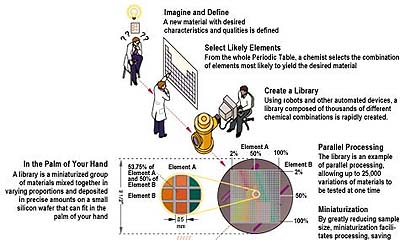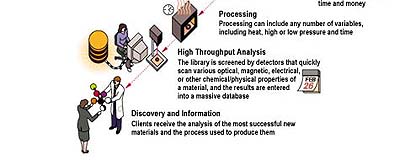Argonaut, Symyx Collaborate on High-Speed Chemical Synthesis and Screening

"Synthetic applications in materials science require specialized capabilities," says Argonaut president David Binkley. "Our relationship with Symyx provides Argonaut the opportunity to be the first to enter the growing arena of combinatorial materials science with a validated technology."
Endeavor builds on Symyx's Parallel Polymerization Reactor (PPR). While it does have the software suite or ultrahigh speeds of Symyx's larger automated screening systems, it will allow chemists to run and screen multiple reactions.
Combinatorial chemistry generates thousands of variations of chemical formulations on silicon wafers by a process similar to ink jet printing. Symyx then runs the array of formulations through an automated high-speed screening system. It provides the inputs needed to determine optical, electronic, magnetic, and physical properties. The technique increases the rate of material discovery and optimization by orders of magnitude and slashes thetime and cost needed to make and analyze samples.


While drug makers have used the technique for discovery since the start of the decade, chemical researchers have not kept pace. Symyx, founded five years ago, ranks among the first companies to adapt the approach to organic, inorganic, and organometallic chemistry. It might prove a very profitable match. Unlike drug companies, chemical companies can market the products they discover without prolonged and expensive testing required of pharmaceuticals.
"The laboratory needs for chemistry are very different from those in pharmaceuticals," says Symyx SVP Jeryl Hilleman. "Symyx spent years developing technologies in this area."
The field has begun to attract attention. This past June, Catalytica, Inc. (Mountain View, CA), and CombiChem, Inc. (San Diego, CA) formed a joint venture to apply combinatorial chemistry to catalyst discovery. Researchers in the Netherlands are trying to form a consortium in the field.
Symyx has risen like a rocket among combinatorial chemical companies. This is largely due to its blue-chip heritage. It was founded Alejandro C. Zaffaroni and Peter G. Schultz. Zaffaroni pioneered the use of combinatorial techniques in pharmaceutical screening and analysis of genetic information as a founder of Affymax NV (now part of Glaxo plc) and Affymetrix.
Schultz teamed with Zaffaroni to found Affymax, and now heads the Novartis Institute for Genomics Research and teaches chemistry at the Scripps Research Institute. While at University of California at Berkeley, he teamed with physicist Xiao-Dong Xiang of Lawrence Berkeley National Laboratory to develop the synthesis and screening technology that Symyx later licensed.
The company made a splash in October 1997, when it published a report in the science journal Nature describing the use of combinatorial chemistry to synthesize and screen more than 25,000 different luminescent materials (phosphors) at once. The paper proved a dramatic demonstration of the new technology. The company has since developed phosphors that it says outperform existing materials.
Since its inception, the private company has raised about $150 million in equity funding and research contracts while growing to more than 150 employees. Its three businesses are contract research, discovery, and equipment development.
According to Hilleman, the company has research alliances with eight chemical companies: Bayer AG, BASF, Celanese, Ciba Specialty Chemicals, Dow Chemical Company, Osram GmbH, and Unilever. The work generally covers commodity chemicals and polyolefins. Symyx generally charges a fee for the research and receives a licensing fee on any commercial products.
It also has its own discovery effort in fine chemicals, specialty polymers (such as block copolymers), and electronic materials (including phosphors). "We will either license or direct commercialize, but we're not there yet and haven't decided," says Hilleman.
Symyx also develops combinatorial chemistry technology, which it plans to sell or license. The company is selling its mid-level PPR technology through Argonaut. "We also make large, automated systems, which we plan to sell to major chemical companies," says Hilleman.
The units combine proprietary robotics, instrumentation, software, and ultralarge scale data management capabilities to scan batches (or libraries) of 100 to 25,000 different chemicals at a time. "We hope to have our first sale in near future," says Hilleman.
Under its deal with Argonaut, Argonaut will develop, manufacture, and distribute Endeavor instruments worldwide and share the profits with Symyx. Argonaut is currently discussing early access to the system with various chemical companies.
"Argonaut has a track record in the development and distribution of automated synthesizers as well as a record of continued product enhancements," says Symyx chairman/CDO Steven Goldby. "This leadership makes Argonaut the ideal partner to enhance and widely commercialize our first instrument offering."
In April, Argonaut launched a consortium of five pharmaceutical and agrochemical companies to develop a parallel synthesizer for chemical process development. The system would allow users to automatically test a range of variables, such as time or temperature, to optimize parameters for chemical process performance. The company expects to commercialize the first system next spring.
Details: Jeryl Hilleman, SVP/CFO, Symyx Technologies, Inc., 3100 Central Expressway, Santa Clara, CA 95051. Phone: 408-764-2054. Fax: 408-764-0175. Email: jhilleman@symyx.com.
Or: Elizabeth Mitchell, Director of Administration, Argonaut Technologies, Inc., 887 Industrial Rd., Suite G, San Carlos CA 94070. Phone: 1-888-598-1350 or 650-598-1350. Fax: 650-598-1359. Email: emitchell@argotech.com.
By Alan S. Brown
